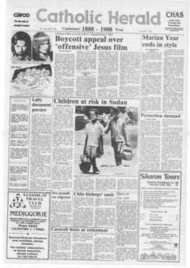Page 2, 19th August 1988
Page 2

Report an error
Noticed an error on this page?If you've noticed an error in this article please click here to report it.
Tags
Share
Related articles
Refugees Set Up Own Industry
Salvador's Way Of The Cross
Plea For Improvements In Salvadorian Camps
Salvador Church Workers Arrested
A Social Fabric Rent Asunder
Chitnis Back In London
Letter from Latin America
Political vacuum
for forgotten war refugees
"SOME fifteen thousand Salvadoran refugees live mainly in three camps in Honduras: Colomoncagua, San Antonia, and Mesa Grande. War and persecution forced them from their homeland, and many of them have been living as long as eight years in the camps. They survive in the hostile conditions of closed camps, aggravated by the harassment and intimidation of the Honduran armed forces".
Such is still the situation today, according to a report just issued by the International Council of Voluntary Agencies (ICVA) based in Geneva, Switzerland. The report was written by a mission that visited all three camps in June, a mission composed of delegates of the British Refugee Council, the Spanish Commission for Refugee Aid, the Canadian Council for International Cooperation, the American Friends Service Committee, and ICVA.
The investigation was a response to growing tension in the camps in early 1988, culminating in the killing of one refugee and the wounding of another.
The situation of the refugees has been complicated since they began to flee El Salvador in 1980 by the fact that Honduras, unlike other Central American states, has not signed the 1951 Refugee Convention or the 1967 Protocol.
The UN refugee agency, UNHCR, in consequence, lacks the juridical status it would have under these agreements. It helps the refugees only to the extent that Honduras agrees and subject to the conditions the government imposes.
The United States has taken advantage of this "juridical vacuum", as the report calls it, to pressurise the Honduran government and armed forces to make life in the camps so unpleasant and so dangerous as to force the. Salvadorans to return home. Since the United States supports the Salvadoran regime diplomatically, economically, and militarily, it cannot admit that Salvadorans would be in danger of death or persecution if they returned home.
There is nothing that the refugees more want than to return to their homes, if they had reasonable assurance of being left in peace. Last October, 4,500 of them decided to take the risk. Surviving much hardship, harassment and delays on the journey, they did in fact get back to locations in El Salvador where they are trying to re-establish themselves.
Years of living in the primitive conditions of a refugee camp take their toll in dependency and boredom. The morale of the Salvadorans, nevertheless, remains remarkably high, even though they constantly complain of inadequate diet, medical assistance, and sanitation. They retain their commitment to the radical change of their society which was envisioned and formulated for them by Archbishop Oscar Romero.
To maintain this spirit through the years of frustrating exile, they have developed a strong internal social fabric. The plastic tents of the first years have been replaced by simple wooden houses. They plant crops to the extent that they can get strips of land, and they also have poultry and small animals.
They make enthusiastic use of education and training programmes provided by the voluntary agencies that work with UNHCR. They want to be able to contribute fully to rebuilding El Salvador when the time comes.
THE 1CVA report is extremely critical of "the de facto decision of the Honduran authorities not to respect fully humanitarian principles", and in particular of the hostile behaviour of the Honduran armed forces. The Honduran military attitudes, it adds, "are bolstered by the attitudes of representatives of the US government who are constantly seen to interfere in camp life against the wishes of the refugees".
The report notes approvingly that an agreement reached by UNHCR and the Honduran government a year ago is a first step toward ensuring for the refugees their rights as such.
World opinion will obviously play an important role in bringing about these reforms. But, as the report also stresses, even more important is pressure to promote the peace process in Central American in the context of the Esquipulas II (Arias) Pact, and it criticises the Honduran government for dragging its feet in this regard. This is one issue on which there can be universal agreement.
Gary MacEoin
blog comments powered by Disqus











